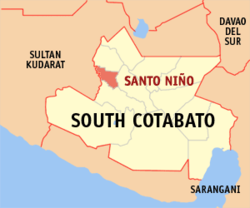Santo Niño, South Cotabato
| Santo Niño | |
|---|---|
| Municipality | |
 Map of South Cotabato with Santo Niño highlighted |
|
| Location within the Philippines | |
| Coordinates: 06°26′N 124°41′E / 6.433°N 124.683°ECoordinates: 06°26′N 124°41′E / 6.433°N 124.683°E | |
| Country | Philippines |
| Region | Soccsksargen (Region XII) |
| Province | South Cotabato |
| District | 2nd district of South Cotabato |
| Established | April 7, 1981 |
| Barangays | 10 |
| Government | |
| • Mayor | Antonio F. Damandaman |
| Area | |
| • Total | 86.20 km2 (33.28 sq mi) |
| Population (2015 census) | |
| • Total | 40,947 |
| • Density | 480/km2 (1,200/sq mi) |
| Time zone | PST (UTC+8) |
| ZIP code | 9509 |
| IDD : area code | +63 (0)83 |
| Income class | 3rd municipal income class |
| 126318000 | |
| Electorate | 22,246 voters as of 2016 |
| Languages | Hiligaynon, Tagalog, English |
| Website | stoninoscot |
Santo Niño (Sto. Niño), or officially Municipality of Santo Niño (Hiligaynon: Banwa sang Santo Niño), is a third class municipality in the province of South Cotabato, Philippines. According to the 2015 census, it has a population of 40,947 people.
Situated in the fertile Allah Valley, it is the smallest municipality by land area in the province.
It is bounded by the Municipality of Norala (its mother-town) in the north, the Municipality of Surallah in the east, Allah River and the Municipality of Bagumbayan, Sultan Kudarat in the south, and the Municipality of Isulan, Sultan Kudarat in the west.
Average temperature in the municipality ranges from a low of 23 °C (73 °F) to a high of 32 °C (90 °F) throughout the year.
Precipitation can be low during the dry season (March to April) at about 40 millimetres (1.6 in) while it can be high especially during the wetter months (May to July) at 100 millimetres (3.9 in).
Sto. Niño is politically subdivided into 10 barangays.
The municipality's name was derived from its patron saint, the “Sto. Niño”, or the Holy Child. It was formerly called Barrio Trece (13) (although many still called the town proper this name) of the Norala Settlement District of then National Land Settlement Administration.
The Sangguniang Panlalawigan (Provincial Council) of South Cotabato passed a resolution in 1980 requesting then Assemblyman Jose T. Sison to file a bill at the Philippine Parliament to create Sto. Niño a municipality. Parliament Bill No. 1220 was finally passed and approved on December 23, 1980, when Ferdinand Marcos signed it into law as Batas Pambansa Bilang 90. In a plebiscite held on April 7, 1981, the law was ratified.
...
Wikipedia

